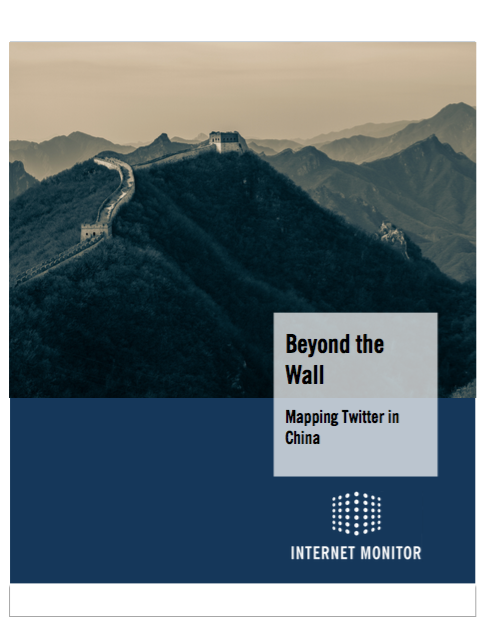New Internet Monitor report: "Beyond the Wall: Mapping Twitter in China"
 Internet Monitor, a project of the Berkman Center for Internet & Society at Harvard University, is delighted to announce the publication of "Beyond the Wall: Mapping Twitter in China," the seventh in a series of special reports that focus on key events and new developments in Internet freedom.
Internet Monitor, a project of the Berkman Center for Internet & Society at Harvard University, is delighted to announce the publication of "Beyond the Wall: Mapping Twitter in China," the seventh in a series of special reports that focus on key events and new developments in Internet freedom.
The report, authored by Sonya Yan Song, Robert Faris, and John Kelly, maps and analyzes the structure and content found on Twitter centered around users in mainland China, offering a rare look at the activity of Chinese Internet users on a platform that is largely unregulated by the state and only reachable through the use of tools that circumvent state-mandated Internet filters:
For Internet users that reside in mainland China, Twitter offers access to news from around the world and a wealth of ideas and perspectives that might otherwise be unavailable there, as well as a platform for building online communities that is not under direct control of the government. This study of Chinese Twitter—to our knowledge the first such study—offers a unique window into the online activities and global connections of Chinese Internet users who actively circumvent content restrictions. Based on a mixed-methods approach, combining social network analysis and a qualitative review of the content and activity of Chinese Twitter, we are able to map and provide detailed accounts of the topically based clusters that form among these networks.
Key observations include:
- Twitter is used by residents of mainland China to follow popular accounts that are not found on Sina Weibo or other Chinese microblogging platforms; the focus of attention includes political, technological, and cultural topics.
- Despite the scale and scope of Chinese social media activity on domestically hosted platforms, there is a demand for content and conversations not found within the Great Firewall.
- A major focus of Chinese Twitter is on politically contentious topics that would be blocked on domestically hosted platforms, such as the Tiananmen Square protests, Tibetan and Uyghur issues, political scandals, and pollution.
- The political crowd, who would face the highest risks for their online speech, appear to be the least likely to seek anonymity: many of these advocates openly tweet under their real names and include their face in their profiles.
- Chinese Twitter falls well short of supporting an inclusive and broadly accessible networked public sphere. The proportion of the Chinese populace with direct access to the debates, communities, and shared resources on Twitter is very small, and the avenues by which such discourse might find its way into mainstream political discussion are severely constrained.
The full paper is available for download at SSRN: Beyond the Wall
About Internet Monitor
Internet Monitor is a research project based at Harvard University's Berkman Center for Internet & Society. Internet Monitor's aim is to evaluate, describe, and summarize the means, mechanisms, and extent of Internet content controls and Internet activity around the world. The project helps researchers, advocates, policymakers, and user communities understand trends in Internet health and activity through research, analysis, and data visualization. More information at thenetmonitor.org.
About the Berkman Center for Internet & Society
Founded in 1997, the Berkman Center for Internet & Society at Harvard University is dedicated to exploring, understanding, and shaping the development of the digitally-networked environment. A diverse, interdisciplinary community of scholars, practitioners, technologists, policy experts, and advocates, we seek to tackle the most important challenges of the digital age while keeping a focus on tangible real-world impact in the public interest. Our faculty, fellows, staff and affiliates conduct research, build tools and platforms, educate others, form bridges and facilitate dialogue across and among diverse communities. More information at www.cyber.law.harvard.edu.